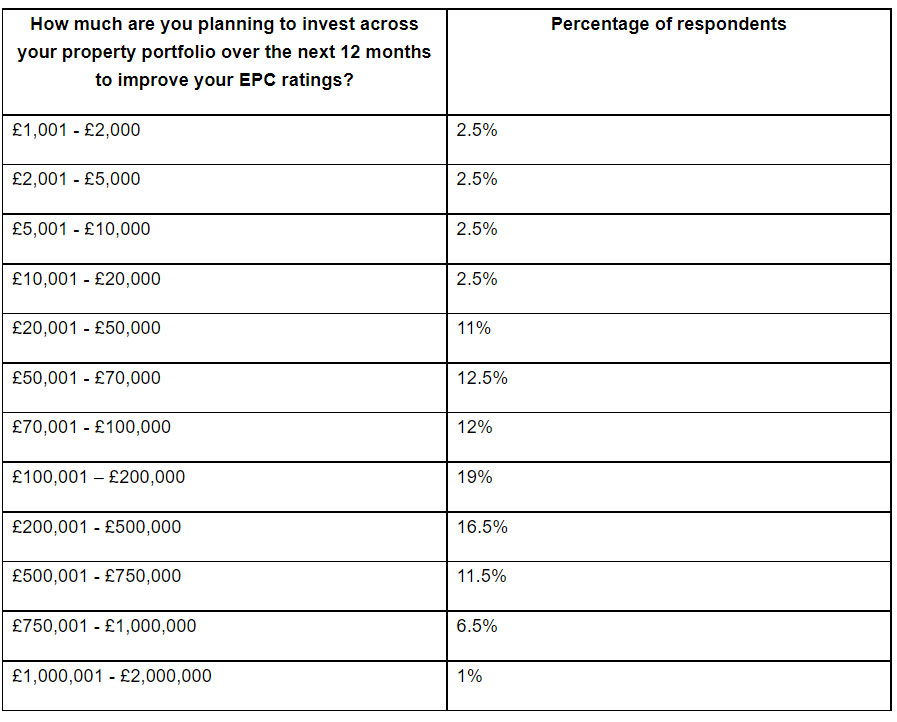
Nearly one in five (19%) professional landlords are planning to invest £500,000 or more over the next 12 months to renovate assets across their portfolios, according to results of this year’s Handelsbanken Professional Landlords Survey.
Professional landlords* are prepared to invest significantly in improving the energy efficiency of their properties over the next 12 months to meet EPC rules, new independent research* conducted on behalf of property business expert Handelsbanken shows.
According to results of this year’s Handelsbanken Professional Landlords Survey – based on nationwide research among professional investors with an average of 29 properties worth c £14 million – nearly one in five (19%) is planning to invest £500,000 or more over the next 12 months to renovate assets across their portfolios. More than half (55%) are planning to invest £100,000 or more, and all property business owners surveyed plan to invest at least £1,000.
The research found that a vast majority (92%) of the respondents expect the value of their portfolios to increase by at least 5% over the same period. With £500,000 representing roughly 3.5% of the average portfolio value of those surveyed, it is likely many will see the increase in value covering said investments.

Minimum Energy Efficiency Standards (MEES) were first implemented in April 2018, but from 1 April this year, the regulations tightened further in England and Wales, ruling it unlawful for a landlord to continue letting a commercial property with an EPC rating of below E.
While well over half (57%) were optimistic regarding their commercial properties meeting these new standards by the deadline, more than two-fifths (44%) admitted they were only moderately familiar with the government’s plan to increase minimum EPC standards to B by 2030.
In 2021, the government consulted on increasing MEES for commercial lettings to EPC C by 2027 and EPC B by 2030 while tightening the system around exemptions.
For privately rented homes in England and Wales, the government consulted on raising MEES to EPC C, applying to new tenancies from 2025 and to all tenancies from 2028. It also suggested lifting the cap on landlords’ maximum spend from £3,500 to £10,000, based on the assumption that landlords will spend £4,700 per property to reach a C rating.
However, Energy Security and Net Zero Minister Graham Stuart signalled recently that a final decision on these proposals would not come this year.
Richard Winder, Head of Sustainability at Handelsbanken, said, “Rolled up across a portfolio, these are not insignificant amounts, and for many investors represent a major step-up in capital expenditure. Beyond these MEES requirements, there are growing expectations on both landlords and tenants to take action on climate change and nature, and these are beginning to affect the economics of the rental market.”
The table below shows a breakdown of how much landlords are planning to invest in their property portfolios over the next 12 months in a direct attempt to improve their EPC ratings.

Richard Winder continued, “Staying in line with EPC regulations and upgrading energy efficiency has become a priority for many customers, who are very aware of the associated challenges. We would encourage investors to look beyond the next compliance hurdle towards the broader sustainability transition underway and to consider the efficiencies and opportunities that might be created by taking a long-term, strategic approach.”
Read the 2023 Handelsbanken Professional Landlords Survey.
* Research conducted by PureProfile in March 2023 among 200 UK professional property investors. The sample was split equally among those owning five and 15 properties, those owning between 15 and 25, those owning between 25 and 50 and those owning more than 50. On average, respondents own 29 properties worth a value of £14 million. There were 17 respondents in each of the UK’s 12 regions apart from Northern Ireland, where there were 13.
Around 62% of the sample classified their business as “real estate investment”, while 22% classified their business as “landlords” (residential and commercial), and 16% classified it as “property management”.
Some 46% of the sample said their property holdings included commercial offices; 41% commercial retail, 41% student lettings/HMOs; 40% commercial industrial; 27% residential non-student lettings/HMOs; 23% residential static park homes; 23% commercial leisure; and 8% commercial healthcare, including hospitality and holiday parks.
For more property news and features, please click here.

![]()




You must be logged in to post a comment.